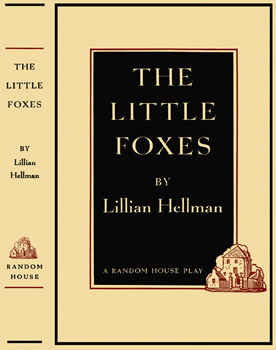
The Little Foxes is a 1939 play by Lillian Hellman, considered a classic of 20th century drama. Its title comes from Chapter 2, Verse 15, of the Song of Solomon in the King James version of the Bible, which reads, "Take us the foxes, the little foxes, that spoil the vines: for our vines have tender grapes." Set in a small town in Alabama in 1900, it focuses on the struggle for control of a family business. Tallulah Bankhead starred in the original production as Regina Hubbard Giddens.
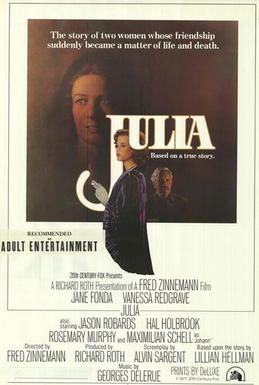
Julia is a 1977 American WWII drama film directed by Fred Zinnemann, from a screenplay by Alvin Sargent. It is based on a chapter from Lillian Hellman's 1973 book Pentimento about the author's relationship with a lifelong friend, Julia, who fought against the Nazis in the years prior to World War II. The film stars Jane Fonda, Vanessa Redgrave, Jason Robards, Hal Holbrook, Rosemary Murphy, Maximilian Schell, and Meryl Streep in her film debut.
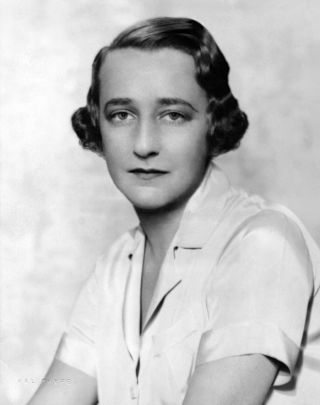
Lillian Florence Hellman was an American playwright, prose writer, memoirist and screenwriter known for her success on Broadway, as well as her communist sympathies and political activism. She was blacklisted after her appearance before the House Committee on Un-American Activities (HUAC) at the height of the anti-communist campaigns of 1947–1952. Although she continued to work on Broadway in the 1950s, her blacklisting by the American film industry caused a drop in her income. Many praised Hellman for refusing to answer questions by HUAC, but others believed, despite her denial, that she had belonged to the Communist Party.

Brenda Blethyn is an English actress. Known for her character work and versatility, she is the recipient of various accolades, including a Golden Globe, a BAFTA, and a Cannes Film Festival Award, as well as nominations for two Academy Awards and two Primetime Emmys. She was appointed Officer of the Order of the British Empire (OBE) for services to drama in 2003.
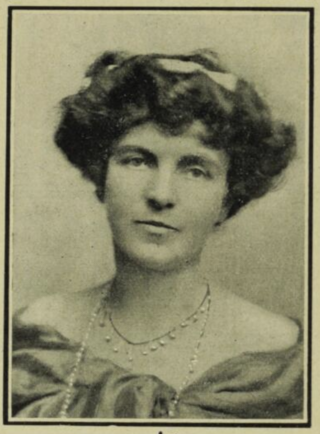
Ethel Turner was an English-born Australian novelist and children's literature writer.

Julia Migenes is an American soprano working primarily in musical theatre repertoire. She was born on the Lower East Side of Manhattan to parents of Irish and Puerto Rican descent. She is sometimes credited as Julia Migenes-Johnson. She attended The High School of Music & Art in New York City.
Sergei Konstantinovitch Pankejeff was a Russian aristocrat from Odesa, Russian Empire. Pankejeff is best known for being a patient of Sigmund Freud, who gave him the pseudonym of Wolf Man to protect his identity, after a dream Pankejeff had of a tree full of white wolves.
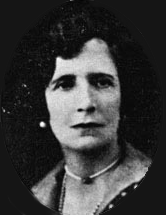
Nesta Helen Webster was an English author who revived conspiracy theories about the Illuminati. She claimed that the secret society's members were occultists, plotting communist world domination, through a Jewish cabal, the Masons and Jesuits. She blamed the group for events including the French Revolution, 1848 Revolution, the First World War, and the Bolshevik Revolution. Her writing influenced later conspiracy theories and ideologies, including American anti-communism and the militia movement.
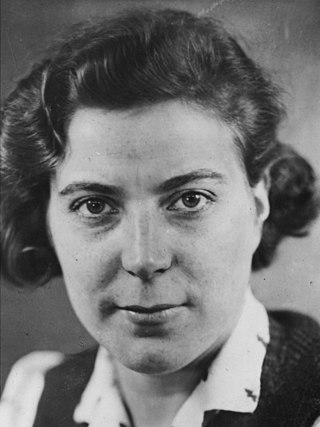
Camelia Ethel MacDonald was a Glasgow-based Scottish anarchist, activist, and 1937 Spanish Civil War broadcaster on pro-Republican, anti-Fascist Barcelona radio.
Muriel Gardiner Buttinger was an American psychoanalyst and psychiatrist.

Ethel Kremer Schwabacher was an influential abstract expressionist painter, represented by the Betty Parsons Gallery in the 1950s and 1960s. She was a protégé and first biographer of Arshile Gorky, and friends with many of the prominent painters of New York at that time, including Willem de Kooning, Richard Pousette-Dart, Kenzo Okada, and José Guerrero. She was also the author of a monograph on the artist John Charles Ford and a memoir, "Hungry for Light".
Joseph Chamberlain Furnas was an American freelance writer.
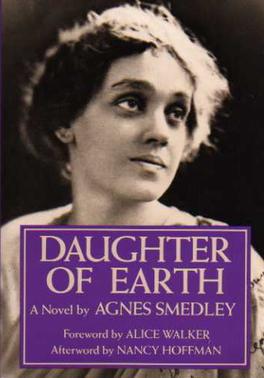
Daughter of Earth (1929) is an autobiographical novel by the American author and journalist Agnes Smedley. The novel chronicles the years of Marie Rogers's tumultuous childhood, struggles in relationships with men, time working with the Socialist Party, and involvement in the Indian independence movement.

Foxfire: Confessions of a Girl Gang is a novel by Joyce Carol Oates about a group of teenage girls in upstate New York in the 1950s who form a gang called Foxfire.

Pentimento: A Book of Portraits is a 1973 book by American writer Lillian Hellman. It is best known for the controversy over the authenticity of a section about an anti-Nazi Resistance member called "Julia", which was later made into Fred Zinneman's film Julia. A psychiatrist named Muriel Gardiner later suggested that her life story was fictionalized as Julia. Gardiner was a wealthy American who went to medical school in the First Austrian Republic following World War I and became involved in the illegal and underground Social Democratic Party of Austria under the rule of Engelbert Dollfuss and the later Austrian Resistance to Nazism there before her return to the US in 1939.
Margaret Emilia Gardiner OBE was a radical modern British patron of artists and resident of Hampstead, London, from 1932, where she was also a left wing political activist. She was also for a time the partner of Professor John Desmond Bernal. She was known as "Mrs Bernal" for most of her life, but they were never married. In the 1980 Birthday Honours she was awarded an OBE for services to the Pier Arts Centre Trust, Stromness. She was referred to as Margaret Emilia Gardiner Bernal on the list.
Brenda Webster is an American writer, critic and translator. She is the author of five novels, including The Beheading Game (2006) and Vienna Triangle (2009), which appeared on bestseller lists in both the San Francisco Chronicle and the Los Angeles Times. Her most recent novel, After Auschwitz: A Love Story, published in 2013, is a story of an elderly man dealing with the early stages of dementia as he struggles to hold on to his memories and cope with his changing relationship to his wife.
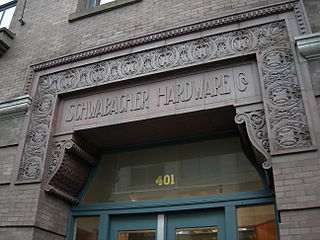
The Schwabacher Brothers—Louis Schwabacher, Abraham (Abe) Schwabacher, and Sigmund (Sig) Schwabacher —were pioneering Bavarian-born Jewish merchants, important in the economic development of the Washington Territory and later Washington state. They owned several businesses bearing their family name, first in San Francisco, then in Walla Walla, Washington, and later in Seattle. Notable among these businesses were Schwabacher Bros. of San Francisco ; Schwabacher Bros. & Company, the Schwabacher Realty Company, the Gatzert-Schwabacher Land Company, and the Schwabacher Hardware Company, all ultimately based in Seattle; and the Stockton Milling Company.
Judith Emlyn Johnson is an American poet.

Jenny Weleminsky was a German-speaking Esperantist and translator who was born in Thalheim, Lower Austria and brought up there and in Vienna. Some of her translations of works by Franz Grillparzer and other notable Austrian writers were published in the literary magazine Literatura Mondo , which became home to an influential group of authors collectively known as Budapeŝto skolo, the Budapest school of Esperanto literature.